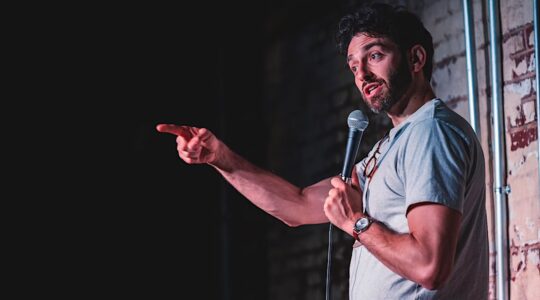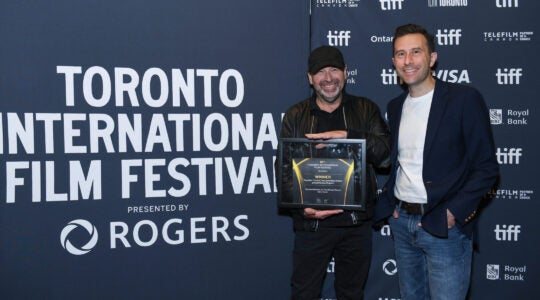The United Synagogue of Conservative Judaism held its biennial convention in Cherry Hill, N.J., this week, and here’s how the media is playing it:
* Bryan Schwartzman of Philadelphia’s Jewish Exponent opened his wrap-up piece on Rabbi Steve Wernick’s call for "a movement-wide task force to tackle the issue of prayer."
"Many of our congregations report that tefillot in many of our synagogues do not speak to them, do not inspire them, and do not reach their heart or their souls," said Wernick, who took over the helms of national organization in July.
Also, Schwartzman reports, the biennial "served as to jump-start a nine-month process in which USCJ will adopt a new, long-range, strategic plan."
* The Exponent also published an opinion piece by Wernick himself, in which he outlined some of his plans and goals:
We’re responding to what we hear as we move from reactive to proactive. We have also begun using technology to share our best practices easily; new monthly teleconferences posted on our Web site now allow congregations to share their successes with others.
We are asking professionals in the field to call synagogues on a regular basis, rather than waiting for emergencies, and we are producing materials and programs for synagogues based on their size, demographics and nature of their communities, rather than stamping out cookie-cutter, one-size-fits-all offerings.
In response to requests for help with developing new leaders, we have begun work on a multiyear training program that takes existing or aspiring synagogue leaders at whatever level they are, and teaches them how to incorporate both Jewish values and practical skills as they move up the leadership ladder.
Our short-term goal is to reorganize in a way that will allow us to live within our means. We hope to get the bulk of the short-term reorganization done by the beginning of January, and the rest of that phase complete by the end of the fiscal year at the end of June.
Our youth programs have long been the jewel in our crown; we plan to blow off the dust so they sparkle again. We have begun the process of examining USY to see how best to attract even more young people who will be our congregants in the coming decades, and we have decided to put resources in K’sharim, expanding our youth movement success to include adults in their 20s and 30s.
We hope that they will take Conservative Judaism and reshape it to make it their own, whether it’s connecting synagogues with nearby Hillels or independent minyanim, or creating new programming for young professionals that doesn’t cry out "Loser Singles Service!"
We’re also hiring an alumni director to help us bring back so many who grew up in our movement — at camp, youth groups and religious and day schools.
Meanwhile, the Hayom Coalition, the ad hoc group of rabbis and synagogue leaders formed to help improve United Synagogue, continues to meet with us in a growing atmosphere of trust.
* Over at the Forward, Joshua Nathan-Kazis focused on the package of organizational reforms that Wernick hopes will strengthen his ability to get things done and hopefully put United Synagogue at the forefront of the Conservative movement’s efforts to reinvigorate itself:
The USCJ is the third major Conservative organization to bring on new leadership in the past two years. At JTS, Eisen replaced longtime chancellor Rabbi Ismar Schorsch in 2007, and at the Rabbinical Assembly, the movement’s rabbinic association, Rabbi Julie Schonfeld was hired this year as executive vice president.
The delegates’ excitement over Wernick translated into strong support for reform of the group’s bylaws — which he has strongly pushed — that will remake the organization into a much more centralized operation. The new bylaws, passed by acclamation at the conference, also shift the USCJ to being a provider of services to congregations, where it formerly functioned more as an umbrella group. Wernick sold the reforms as essential for the movement’s future. They are “a giant step forward to give us the flexibility of policy decision making to support the kind of work we need to do,” he told the Forward.
For Wernick, a centralized USCJ is the obvious focal point of a reinvigorated Conservative Judaism. In his address to the convention, Wernick described USCJ as the beating heart of the Conservative movement.
“We are the organization that unites Conservative synagogues,” Wernick said. “The synagogue is the only place where everyone meets: congregant and professional, Women’s League and Men’s Club, USY [United Synagogue Youth] and Camp Ramah, Israel experience and Masorti, the Jewish Theological Seminary, the American Jewish University; everyone. You name the ‘arm’; it connects to the ‘body’ in shul. United Synagogue is the muscle that connects all of our ‘bodies’ together.”
* Nathan-Kazis also filed a piece on an address by Israel’s ambassador to Washington, Michael Oren, in which he blasted the lobbying group J Street:
Addressing a breakfast session at the United Synagogue of Conservative Judaism’s biennial convention December 7, Ambassador Michael Oren described J Street as “a unique problem in that it not only opposes one policy of one Israeli government, it opposes all policies of all Israeli governments. It’s significantly out of the mainstream.”
After a speech that touched on the spiritual basis for and the threats to the state of Israel, Oren issued an unscripted condemnation of J Street.
“This is not a matter of settlements here [or] there. We understand there are differences of opinion,” Oren said. “But when it comes to the survival of the Jewish state, there should be no differences of opinion. You are fooling around with the lives of 7 million people. This is no joke.” …
Oren criticized J Street after an audience member asked him how synagogues should respond if congregants requested that the group be invited to make a presentation.
Oren also disputed claims that an activist associated with the prayer group Women of the Wall, Nofrat Frenkel, had been detained by police for wearing a tallit and carrying a Torah in the women’s section of the Kotel. The ambassador said that the woman was simply led away from the area.
Nathan-Kazis noted that Frenkel offered a different version in a piece she wrote for the Forward. She wrote:
As we were exiting with me carrying the Torah, a policeman met us and began forcefully pushing me toward the nearby police station. Our pleas and explanations that we were on our way to the alternative site were of no use. I was transferred for questioning to the station at David’s Citadel. All I had on me was my tallit, my siddur and a sefer Torah.
* Stewart Ain of The New York Jewish Week filed a general overview, which included some information about the United Synagogue’s new plans for developing a new generation of leaders:
Mindful of all the gray hair among the leaders here — the vast majority of whom appeared to be over the age of 50 — the last questioner asked what the movement planned to do to attract Jews in their 20s and 30s. Rabbi Wernick pointed out that attending the convention were 35 young adults under the age of 45 who were members of the newly created Young Leadership Institute. And he said professionals in the newly created six districts across North America would also be asked to identify and nurture young leaders.
Incoming president Skolnik said young leadership development would be among his highest priorities as he assumes office, succeeding Ray Goldstein. He said he has asked the 35 young leaders at the convention to join a United Synagogue committee.
“We’re looking for emerging leaders,” he explained. “Somebody who comes to shul every Shabbat or is on a youth education committee. … It’s like the Yankee’s farm operation.”
Rabbi Wernick said the movement is now developing a “system-wide leadership development program to train North American synagogue leaders” just as it now trains synagogue presidents.”
UPDATE: Oh, and this from the Courier-Post on a plenary session on creating inclusive synagogues.
JTA has documented Jewish history in real-time for over a century. Keep our journalism strong by joining us in supporting independent, award-winning reporting.





